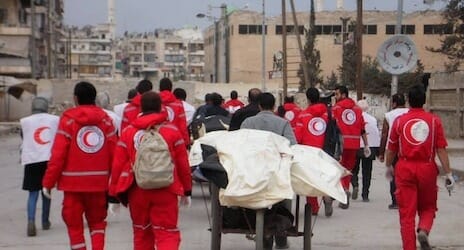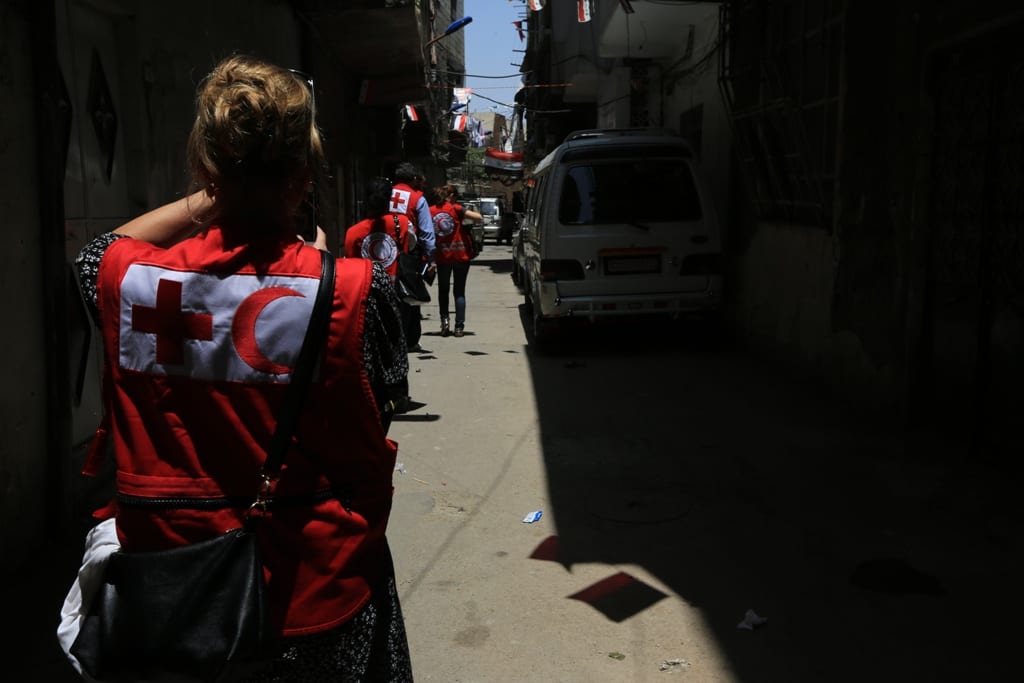By Vivian Tou’meh and Sana Tarabishi, SARC
Prior to the conflict in Syria, the Syrian Arab Red Crescent (SARC) was a very different organization with a very different mission. It had been a significant presence in support of people fleeing other crises in the region. Branches close to the border with Iraq, for instance, had become well-versed in supporting refugees. The nature of SARC’s mission changed in 2011.
The Aleppo branch, which has been involved in major operations since the outbreak of violence, was established in 1947. In its early years, the branch provided health services to local people – mostly children – for a modest fee. In 1972, plans were laid to build a children’s hospital on donated land. With support of many sister National Societies, this hospital was opened four years later. The branch now consists of nine sub-branches and its work has grown far beyond the provision of medical services.
Dr Muhammed Walid Sankari, SARC branch president, said SARC faces a number of major hurdles in its efforts to support the people of Aleppo due to the conflict. “The difficulties we face are mainly due to the on-going fighting and its changing nature in the field. We always work to find the appropriate time to secure safe access for our teams to deliver impartial aid to as many areas as possible,” he said. “These challenges change on a daily basis and from one area to another.”
Challenges large and small
At the outset of the conflict, the branch established an emergency committee to deal with urgent matters related to civil services such as repairs to the electricity network – often subject to interruptions – and the delivery of the fuels for water pumping stations. This committee also undertakes the necessary mediation to exchange corpses and to facilitate the exchange of prisoners between both sides.
While danger is ever-present, the branch faces a few mundane difficulties to its work. “There are a lot of challenges, such as securing the needed fund to purchase the fuel needed for our teams to commute,” Dr Sankari said. “We also need continuous cooperation and communication with SARC headquarters, which is not always possible as power cuts limit our use of communication devices.”
And, of course, the conflict has an impact. “Providing people with humanitarian assistance during heavy fighting is the most difficult challenge our branch is currently facing,” said Sana Tarabishi, SARC’s Aleppo branch communication officer. “We were forced to evacuate our headquarters in Aleppo city when the fighting came very near.” The organization is currently housed in the Children’s Hospital, unable to return to the city.
Despite all these problems, SARC has not had a problem recruiting volunteers but, Dr Sankari said, finding the capacity to train them is not so easy. “Demand for volunteering is extremely high, but the challenge is that we are not finding enough time to properly train the new recruits and so they learn in the field,” he said. “At the moment, financial support is needed to support the operations. Moreover, we need service cars, electric generators, radio stations and more offices.”
Since the beginning of the fighting in Aleppo, over 1,780 volunteers have been trained to provide help in many fields – at least 400 volunteers are now actively involved in SARC’s Aleppo branch aid operations.
“Volunteers are risking their lives to help people in need. The least we should do is provide them the proper training and the financial support to help them commute,” Dr Sakari said.
In their own words
“Volunteering means working together to safeguard human life and dignity, to live without discrimination to sex, religion, race, political views or ethnicity. It is to remain neutral in a highly polarized conflict.”
Dr. Fares Kady, health care coordinator at SARC Aleppo.
“I am a volunteer. My commitment to the principles of humanity, neutrality, impartiality and independence is my only safeguard.”
Yehia Bozo, public relations and negotiation officer at SARC Aleppo.
“One of the happiest moments in my experience volunteering with SARC Aleppo was when a detainee in Aleppo Central Prison told me that he waits for our visit with impatience and that he prays for our safety. He also called us the Red Angels.”
Musaab Khojah, volunteer at SARC Aleppo.



Discussion about this post